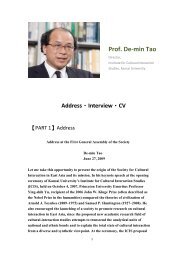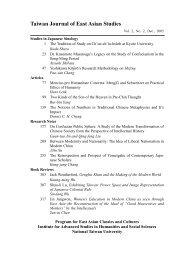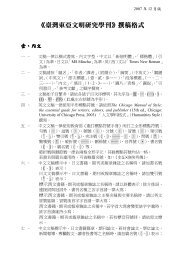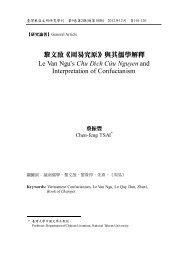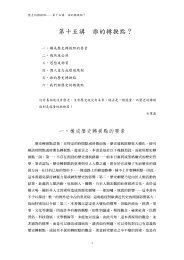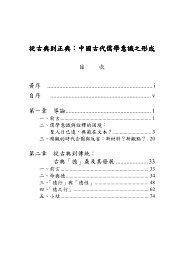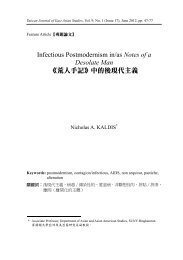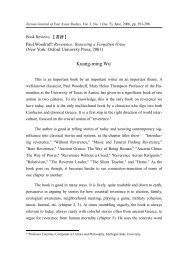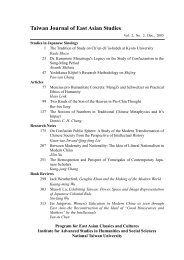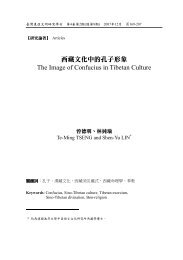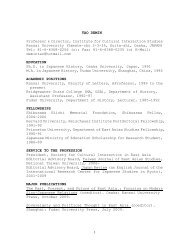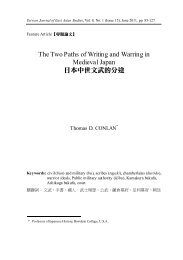臺灣東亞文明研究學刊 - 東亞經典與文化研究計畫 - 國立臺灣大學
臺灣東亞文明研究學刊 - 東亞經典與文化研究計畫 - 國立臺灣大學
臺灣東亞文明研究學刊 - 東亞經典與文化研究計畫 - 國立臺灣大學
Create successful ePaper yourself
Turn your PDF publications into a flip-book with our unique Google optimized e-Paper software.
汪 文尠 聖 對 於 他 者 真 實 構庂 成 的 力 量 探 源 ── 從 胡秦 塞 爾庵 現 象 學 的 觀毢 點 出屒 發 29<br />
Abstract<br />
This paper starts from the research of the intersubjective constitution in<br />
Husserl's phenomenology, and shows that the real constitution of the other in the<br />
Western philosophy basically appeals to two different forces, namely the force of<br />
natural purpose and that of moral will, which, according to a just simple division,<br />
respectively originate from the Greek and the Christian culture. The former can be<br />
represented by Aristotle's philosophy, while the later by Kant's philosophy.<br />
Certainly for them, the word "nature" (phýsis) can be comprehended in multiple<br />
meanings. Especially, it has some overlapping meaning with "reason" (lógos) of<br />
human beings, which itself is also consisted of many meanings. This manifests that<br />
the simple division as above mentioned really has more complex implications in<br />
regard to the relationship between "reason" and "nature" about which the Western<br />
philosophy has discussed long since.<br />
Under this aspect, the concept "ethics" emerges. It is different from the concept<br />
"morality" . But because the meaning of "ethics" swings between natural destiny<br />
and moral reason, different philosophers conceive it in different ways. So this paper<br />
points out that Heidegger who tends to understand "ethics" in connection with the<br />
natural destiny has another view of ethics as Aristotle and Husserl who tend to<br />
conceive ethics in direction of the moral reason. Heidegger's this view of ethics is<br />
rather characterized with artistic spirit. On the other hand, if and how Husserl was<br />
more than Aristotle impacted by the Christianity is not yet treated in this paper.<br />
After these complex implications have been cleared, we divide the different<br />
forces which constitute the other into the following three types: artistic, ethic and<br />
moral. They appear as result when we emphasize wisdom or will or both of them as<br />
the essential meaning of our reason to face the nature, including the other. So the<br />
topic of feeling—for example love, which is related to the Christian culture—as<br />
force to constitute the other is also not to be developed in this paper.<br />
The discussions about the other could be more abundant within the Eastern or<br />
Chinese philosophy. The result of our research should provide them with some<br />
ideas to rethink. This is also to be investigated later.<br />
iii



